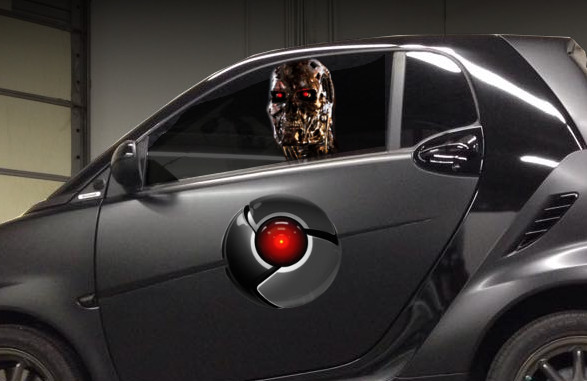Not once was the self-driving car the cause of the accident.
— Chris Urmson, director of Google’s self-driving project
According to Urmson, in the last six years Google’s self driving cars have driven themselves at least a million miles. There have been twelve accidents, but some occurred when a human was driving (humans drove the cars an additional 700,000 miles). All were minor incidents with no injuries and most of these were other drivers hitting or rear-ending the Google car. This sounds like great news that we should be excited to hear. Zero accidents, injuries, or damage has been caused by er, auto-autos over the course of a million miles and a half dozen years. Beats my record.

But much of the media focuses on or attempts to fabricate fear, uncertainty and doubt. One might cynically believe the media simply lives and breathes fear because that is how you get paid in the news business, but I think there is more going on here. Watching how hard and how fast they bend over backward, how they squint at the facts in seeming desperation to find some way to be afraid of the future leads me to suspect the cultural shift to a world with machine drivers is scary because it is different, and because Americans fear change just slightly more than giant spiders that drool Ebola.
A quick review.
Self-driving cars can’t avoid accidents on California Roads, Associated Press
Google Blames Humans for Accidents Involving Its Self-Driving Cars, Time
Google’s self-driving cars have been getting in accidents in California, Business Insider
Google’s driverless cars have been involved in three car accidents, qz.com
Google’s self-driving cars are getting into accidents, MarketWatch
No one knows if such an accident-free future is even possible, or whether autonomous vehicles will prove as flexible and responsive as humans in the most dangerous and unpredictable scenarios. Either way, hiding minor accident reports from the public suggests a rocky road ahead for self-driving cars.
Google’s self-driving cars involved in 11 accidents, director says, Reuters
Just to be fair, there are positive headlines, too:
Every Google self-driving car accident was caused by human error, Techradar
Also many of these do mention the fact that the cars did not cause the accidents and that the accident rate comparison between man and machine is skewed because every incident is reported in the test program, but people often do not report minor accidents. Still, the perspective is one of suspicion and implication of danger with weasel words like “involved in”. It has needlessly put Google on the defensive. Some outlets then report it as if Google is on trial and not to be trusted with “Google blames humans…” sort of headlines.
This is terrible journalism designed to upset you. Google’s program and the data we have are cause for great optimism, and at this point, only optimism! I make no claims this can not change, but right now, we’re golden. Here’s why.
1. The machine driver caused zero accidents. I know I said this already. It bears repeating. None. No times.
2. The “high” accident rate is new evidence about how bad humans drive. The Google cars are required to report absolutely every incident, no matter how trivial, how minor or absent the damage. People do not. The higher rate is probably a truer estimate of how much more often people cause minor accidents versus common estimates. This means machine drivers could be even better for safety and money-saving than we presently estimate.
3. No major accidents at all. The speeds were 10 mph or less in almost all cases. Again, zero injuries. Fantastic.
4. This is how airplanes have worked for years. Many can land without human assistance, and have been able to for a long time. Granted, there are fewer jets in the air than cars on the ground, but even if you controlled for congestion, there is no question that air travel and transport are almost unbelievably safe at 3 deaths per 10 billion passenger miles. Safety stats have improved as machine-assisted technologies have become more and more integrated. In 2009 there were 4.1 accidents per one million departures world-wide. In 2013, just 2.8. According to the Internation Civil Aviation Organization, 2014 was the safest year in history (pdf 2014 safety report).
5. This is beta testing. The machine drivers already have a stellar record, but are at least a couple of years away from commercial release. In that time they will surely get even better. So will their sensors, their “eyes”. Many products and technologies we rely on today started out far inferior to what we are used to. Solar panels used to be laughably inefficient and expensive. Microsoft Windows was universally detested until 3.11 (and by many still, until Win95). The first cars were horrible things; loud, dirty, breakdown-prone, expensive messes.
Why is it now we’re so averse to giving a new technology time to mature?
The only story any reputable media source should have reported is how excellent this technology, beta though it is, is performing and how it is highlighting just how badly we need it (when objectively tracked, we’re seeing how often people really cause accidents). It’s absurd for Google to be on the defensive, here. I am no shill for Google. Its failures and mis-steps are numerous and strikingly awful (Buzz, Wave, Glass, and arguably G+ to name a few). But they really deserve credit here for a fantastic research and development program that is going to radically change our lives for the better.
